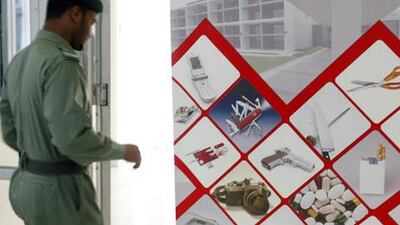DUBAI // Drugs and sharp objects are among the banned items inmates try to smuggle into Dubai Central Prison in their underwear and shoes.
Major General Mohammed al Suwaidi, the head of the punitive establishments department, said officers were working hard to combat smuggling.
"One of the main targets in our strategy is to achieve a zero smuggling and escape rate," he said. "These incidents are kept to an absolute minimum by the security we have in place. Nothing goes unnoticed."
The prison, divided across four buildings, houses 4,000 inmates on average, including 450 female prisoners and 14 juvenile inmates.
X-ray machines are placed at the main entrance to the prison, and a police dog is on hand at all times to sniff out any drugs that might have passed through the many other levels of security scrutiny at the prison.
The grounds and interior of the prison are monitored around the clock by 470 fixed and rotating cameras.
Ringing the perimeter of the facility are three separate security barriers. These fences are equipped with pressure-activated sensors. If activated beyond a certain weight, the sensors trigger an alarm and direct all cameras in the area to focus on that spot, enabling control room staff to see how the perimeter is being breached.
Cameras are located inside the corridors of each cell row, but no cameras are placed inside prisoners' cells.
"Having a camera in the cell is an infringement on the prisoner's privacy and thus a human-rights violation," said Lieutenant Ahmed al Khoury, the head of the surveillance and control room at the prison.
Each section of the prison is equipped with its own surveillance and control room, which in turn is connected to the main control room located in the prison's administrative block.
At any given time, there are at least 30 guards on duty in the male prison section.
Lt Khalifa al Falasi, the head of public relations for correctional institutions, said inmates continually tried to find new ways to smuggle in prohibited items. But police are also constantly seeking to upgrade their detection mechanisms.
"They try to smuggle things in their underwear and shoes, and are always looking for new ways to escape our monitoring," he said, but declined to elaborate further on these techniques for fear of passing on new ideas.
"Still, we always discover them and develop new prevention means to combat it.
"Drills are carried out regularly by the prison staff to check the effectiveness of the security measures and the readiness of prison staff to foil any smuggling attempt," Maj Gen al Suwaidi added.
Lieut al Khoury said the force depended on technology to keep a tight rein on the prison.
"Our focus is not on manpower but on the technology we can use to help us keep track of the prison," he said.
Strict measures are taken when inspecting visitors to ensure that items are not smuggled into the prison. Visitors are searched on arrival and then issued a visit pass.
Food from outside the prison is prohibited, as are sharp items.
Clothing may be brought in under special conditions but must be well searched before it is given to the prisoner.
Medicine is also prohibited unless it is provided by the prison doctor and taken under the prison's medical staff supervision.
"Some people try to smuggle cough syrup in as they get high on it," Lt al Falasi said.
As a precautionary measure, inmates convicted of drug crimes are not allowed to be in the same room as their visitors. They must communicate by phone from behind a glass screen.

